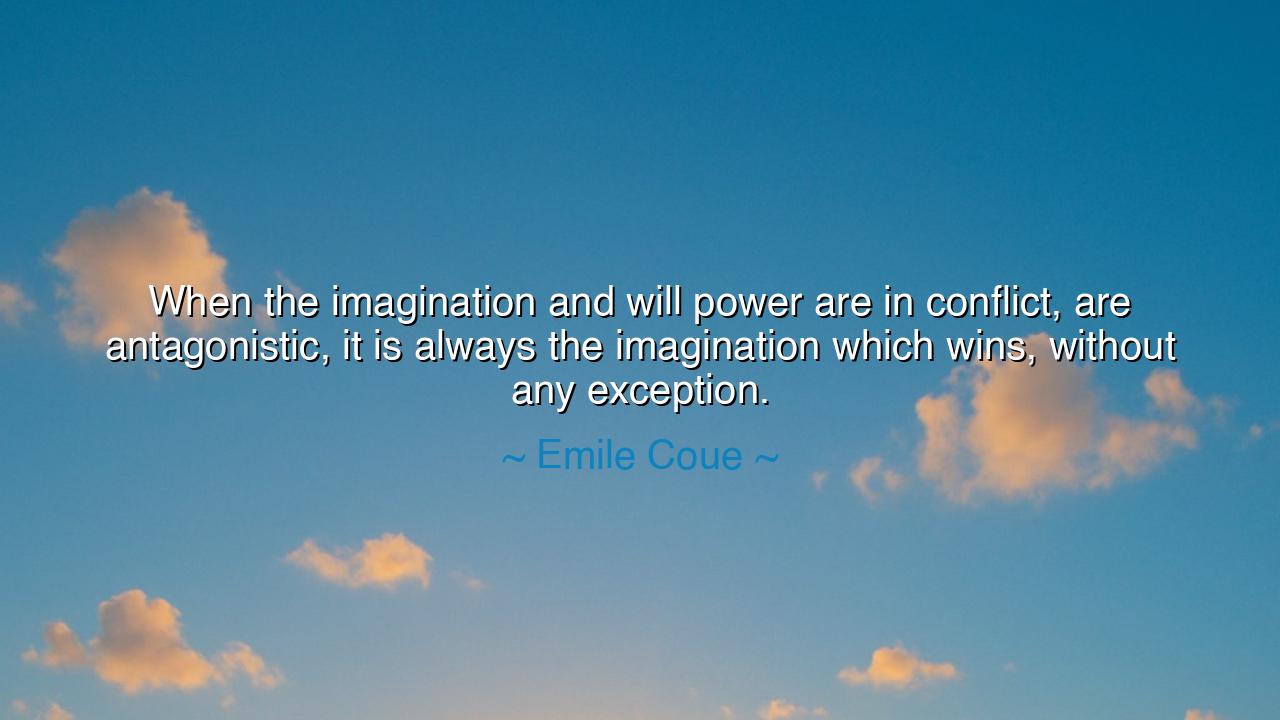
When the imagination and will power are in conflict, are
When the imagination and will power are in conflict, are antagonistic, it is always the imagination which wins, without any exception.






The Sovereignty of the Mind: When Imagination Triumphs Over Will
Hear, O seeker of inner mastery, the words of Émile Coué, the sage of the subconscious, who declared: “When the imagination and will power are in conflict, are antagonistic, it is always the imagination which wins, without any exception.” In this statement lies a truth that has outlived empires — that the will, proud and deliberate, is but a frail commander when opposed by the vast and unseen legions of imagination. The conscious mind may decree one thing, but if the imagination envisions another, it is the image, not the command, that becomes reality.
Coué, a French pharmacist and psychologist of the early twentieth century, devoted his life to understanding the mysterious power of autosuggestion — the dialogue between thought and belief. He observed that when a patient’s imagination pictured healing, recovery often followed; but when the imagination was filled with fear or doubt, no amount of effort could overcome it. From this, he discerned a law of human nature: the imagination governs action. The will may say, “I can,” but if the imagination whispers, “I cannot,” the body and spirit obey the whisper.
The ancients understood this long before Coué gave it form. In the teachings of the East, the mind’s vision was said to shape reality; in the mysteries of Greece, the poet’s imagination was divine fire. Even the Scriptures spoke of faith as “the substance of things hoped for,” for to imagine deeply is to plant the seed of creation. The imagination, unseen yet inexorable, directs the currents of thought and behavior beneath consciousness itself. The will commands only what the surface can touch; the imagination rules the depths.
Consider the story of the great Hannibal Barca, who, as a child, swore before his father to destroy Rome. He possessed both will and courage, yet what drove him across the Alps with elephants and soldiers through snow and storm was not command alone — it was imagination. In his mind, he saw victory, he felt it, he lived it before it came. When others faltered, his vision sustained him. So too, in modern times, those who conquer fear or achieve greatness do so not by sheer stubbornness, but by first shaping the image of triumph within. The imagination leads, and the will follows.
But this truth also warns us. For imagination is not a gentle master. If it envisions failure, fear, or unworthiness, no act of will can overcome it until that inner picture changes. The person who says, “I will not fail,” yet secretly imagines disaster, will find their body trembling and their effort weak. The subconscious obeys the image, not the declaration. Thus, the wise must first align their imagination with their purpose, painting within the mind a vision of what must be, until the will moves effortlessly in its direction.
Coué taught a simple yet profound practice to harmonize these forces. He instructed his patients to repeat positive affirmations — not with strain or force, but with calm conviction — to replace fearful images with healing ones. “Every day, in every way, I am getting better and better,” he would say. Though mocked by some, his method worked wonders, for he understood the truth that belief creates reality. The imagination, once persuaded, reorders the whole being. The will then becomes not a warrior in battle, but a servant to a higher power — the creative force of belief.
O listener, let this be your lesson: When imagination and will conflict, imagination wins — but when they unite, miracles occur. Do not try to force the world by strength alone; envision it first within. Close your eyes and see the person you wish to become. Feel it, believe it, let it take root until it feels more real than your doubts. For what the mind holds in imagination, the body will strive to fulfill. Will is the hand, but imagination is the soul that guides it.
Therefore, align your inner vision with your purpose. Feed your mind with noble images, bright hopes, and sacred possibilities. For the imagination is the architect of destiny — and when it builds in harmony with your will, the world itself will move to make your vision real. As Émile Coué taught, the mind is both temple and throne: tend it well, and it shall obey you; neglect it, and you shall obey it.






AAdministratorAdministrator
Welcome, honored guests. Please leave a comment, we will respond soon